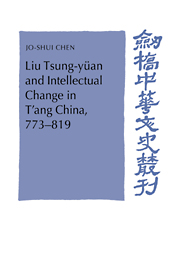Book contents
- Frontmatter
- Contents
- Acknowledgments
- Maps
- Chronology
- Abbreviations
- Introduction
- 1 Literati and thought in the early and middle T'ang
- 2 Liu Tsung-yüan and the circumstances of Ch'ang-an
- 3 805: The abortive reform
- 4 Declaration of principles: Tao and antiquity
- 5 Heaven, the supernatural, and Tao
- 6 Literary theory, canonical studies, and beyond
- 7 Sources of Liu's Confucian thought
- 8 The private sphere
- Conclusion
- Glossary
- Bibliography
- Index
6 - Literary theory, canonical studies, and beyond
Published online by Cambridge University Press: 07 October 2009
- Frontmatter
- Contents
- Acknowledgments
- Maps
- Chronology
- Abbreviations
- Introduction
- 1 Literati and thought in the early and middle T'ang
- 2 Liu Tsung-yüan and the circumstances of Ch'ang-an
- 3 805: The abortive reform
- 4 Declaration of principles: Tao and antiquity
- 5 Heaven, the supernatural, and Tao
- 6 Literary theory, canonical studies, and beyond
- 7 Sources of Liu's Confucian thought
- 8 The private sphere
- Conclusion
- Glossary
- Bibliography
- Index
Summary
In spite of possessing forceful views on the Confucian doctrine, Liu Tsung-yüan was far from a speculative thinker who immersed himself in abstract ideas. The mid-T'ang Confucian revival itself, in fact, did not display the features of an independent intellectual movement until the early ninth century. At its inception, the Confucian revival was inseparable from – or, perhaps not too exaggeratedly, parasitic on – some new trends in literary ideas and studies of the Confucian canon. While the ku-wen (ancient prose) movement was indisputably the prime foundation of the Confucian renewal, the Confucian exegetics exemplified by the work of such classicists as Tan Chu and Shih Shih-kai also contributed to this development. By the early ninth century, although the discourse of leading Confucian intellectuals on the Confucian teaching had gone beyond issues in literary writing and classical scholarship, virtually all of them were writers and a number of them held deep interest in classical studies. In other words, literary theories and canonical scholarship continued to be important constituents of the Confucian revival. As a leading ku-wen master and a follower of the new classical scholarship pioneered by Tan Chu, Liu Tsung-yüan was involved in these two areas of intellectual activity even more deeply than most of his comrades. An examination of his views on, and practice of, writing and classical studies, therefore, should shed further light not only on his own thought but also on the contemporary intellectual scene as a whole.
- Type
- Chapter
- Information
- Liu Tsung-yüan and Intellectual Change in T'ang China, 773–819 , pp. 127 - 148Publisher: Cambridge University PressPrint publication year: 1992



